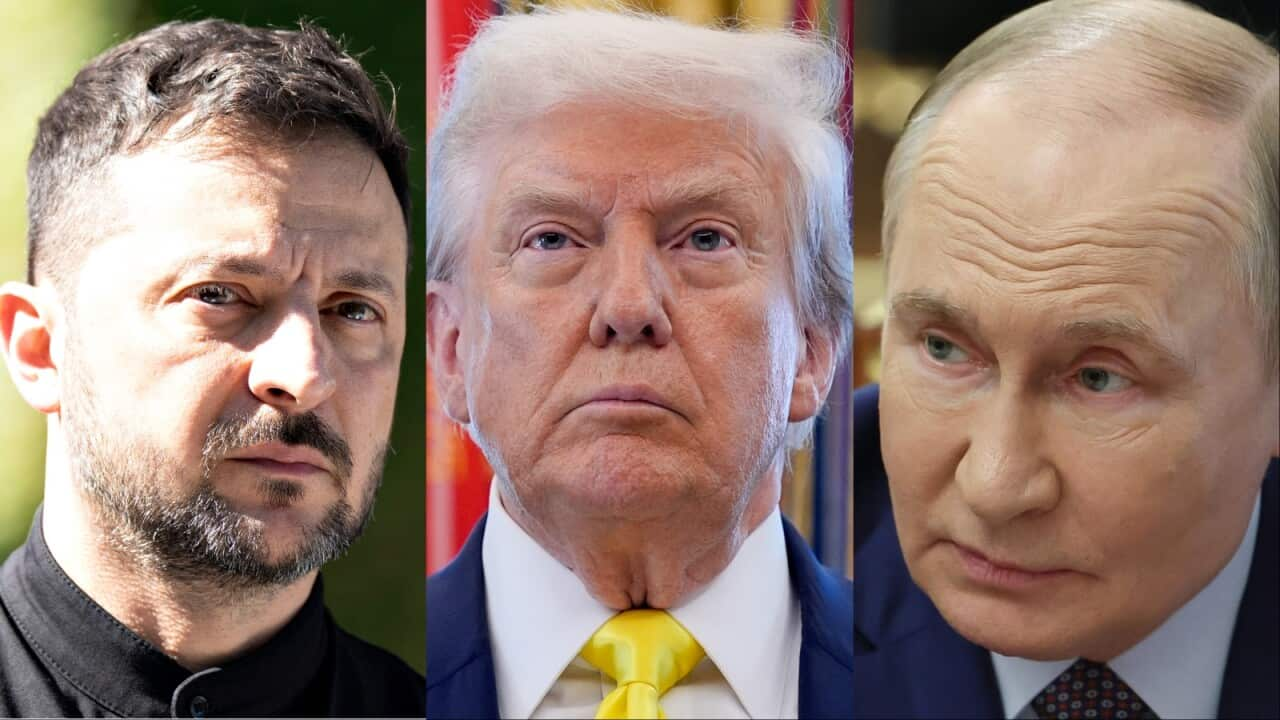European leaders and Ukrainian President Volodymyr Zelenskyy will hold online talks with US President Donald Trump on Wednesday, hoping to convince him to respect Kyiv's interests when he discusses the war with Russia's Vladimir Putin in Alaska on Friday.
Zelenskyy will travel to Berlin to join the afternoon video conference with the host, Chancellor Friedrich Merz, a German government source told Agence France-Presse.
Merz has also invited the French, British and other European leaders and the heads of the EU and NATO to take part in the talks.
They are then expected to talk to Trump and Vice President JD Vance in a second round of the conference call.
Trump, in a post on Truth Social, confirmed he would be speaking with European leaders, and said they were "great people who want to see a deal done".
Russia, meanwhile, said on Wednesday that its stance on ending the war has not changed since Putin set out his conditions last year: the full withdrawal of Kyiv's forces from key Ukrainian regions and the abandonment of its NATO ambitions.
Trump has suggested an exchange of territory might be part of any potential peace deal. Russian troops have already occupied almost a fifth of Ukraine.
That includes all of Crimea, all of Luhansk, more than 70 per cent of the Donetsk, Zaporizhzhia and Kherson regions, and slivers of the Kharkiv, Sumy, Mykolaiv and Dnipropetrovsk regions.
After reports by some media that Washington understood Putin was ready to compromise on his territorial demands, the Russian Foreign Ministry's deputy spokesperson, Alexei Fadeev, was asked by reporters if Russia's position had changed or not.
"Russia's position remains unchanged, and it was voiced in this very hall just over a year ago, on June 14, 2024," Fadeev said, referring to a speech Putin delivered then at the foreign ministry.
At that time, in his fullest public remarks so far about the shape of a possible settlement, the Kremlin chief set out demands including the withdrawal of Ukrainian troops from the parts of Donetsk, Zaporizhzhia and Kherson that they still control.
Putin also said that Kyiv would have to officially notify Moscow that it was abandoning its plans to join the US-led NATO military alliance, and that it intended to remain neutral and non-aligned.
In addition, Putin said that the rights and freedoms of Russian-speakers in Ukraine would have to be ensured, and the "realities" that Crimea, Luhansk, Donetsk, Zaporizhzhia and Kherson were now part of Russia.
Zelenskyy said on Tuesday that he would reject any Russian proposal to pull Ukrainian troops out of the eastern Donbas region as it would deprive Ukraine of defensive lines and open the way for Russia to conduct further offensives.
The Ukrainian leader told reporters that territorial issues should be discussed after Russia agrees to a ceasefire, and security guarantees for Ukraine should be an integral part of that discussion.
In the first US-Russia summit since 2021, Putin and Trump will meet on Friday at Elmendorf Air Force Base in Anchorage, Alaska, two White House officials said.
Speaking ahead of Friday's summit between Trump and Putin, Zelenskyy also reiterated Ukraine must be involved in any talks concerning its own territory.
The unpredictability of how the summit will play out has fuelled European fears that the US and Russian leaders could take far-reaching decisions and even seek to coerce Ukraine into an unfavourable deal.
Zelenskyy said Russia's proposal was to halt its advances in other Ukrainian regions in exchange for Ukraine pulling back its forces from the Donbas in eastern Ukraine, which comprises the regions of Donetsk and Luhansk.
Zelenskyy said Ukraine still controlled about 30 per cent of the Donetsk region, or about 9,000 square kilometres, and had heavily fortified defensive lines and controlled strategic high ground there.
Any pullout would create a launch pad for new Russian offensives, he said.
"We will not leave Donbas. We cannot do this. Everyone forgets the first part — our territories are illegally occupied,” Zelenskyy told reporters at a briefing on Tuesday.
"Donbas for the Russians is a springboard for a future new offensive."
Trump-Putin meeting 'a listening exercise'
On Tuesday, Trump's administration tempered expectations for major progress toward a ceasefire during his meeting with Putin, calling it a "listening exercise".
Asked why Zelenskyy was not joining the US and Russian leaders at the Alaska summit, a White House spokesperson said the bilateral meeting had been proposed by Putin, and that Trump accepted to get a "better understanding" of how to end the war.
"Only one party that's involved in this war is going to be present, and so this is for the president to go and to get a more firm and better understanding of how we can hopefully bring this war to an end," press secretary Karoline Leavitt told reporters. "You need both countries to agree to a deal."
Trump is open to a trilateral meeting with Putin and Zelenskyy later, Leavitt said.
Russia makes fresh advance
In one of the most extensive incursions so far this year, Russian troops advanced near the coal-mining town of Dobropillia, part of Putin's campaign to take full control of Ukraine's Donetsk region. Ukraine's military dispatched reserve troops, saying they were in difficult combat against Russian soldiers.
Ukraine's military, meanwhile, said it had retaken two villages in the eastern region of Sumy on Monday, part of a small reversal in more than a year of slow, attritional Russian gains in the south-east.
Russia, which launched its full-scale invasion of Ukraine in February 2022, has mounted a new offensive this year in Sumy after Putin demanded a "buffer zone" there.
Ukraine and its European allies fear that Trump, keen to claim credit for making peace and seal new business deals with Russia's government, will end up rewarding Putin for his 11 years spent in efforts to seize Ukrainian territory, the last three in open warfare.
For the latest from SBS News, download our app and subscribe to our newsletter.

